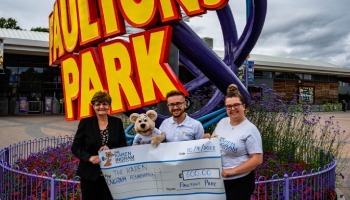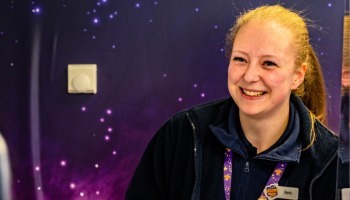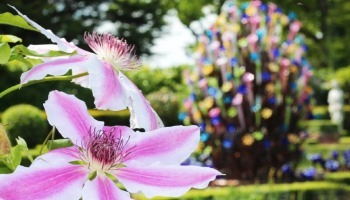
What we do for the environment

Electricity Usage and Generation
At Paultons Park, we are thrilled to announce the completion of the first phase of our major solar energy project in 2025, marking a significant milestone in our journey toward sustainability. This groundbreaking initiative now enables us to generate 35% of our annual electricity usage on-site, reinforcing our commitment to reducing our environmental impact.
The project, which represents a £1.5 million investment, features innovative solar car port canopies that cover two of our car parks and additional solar roof panels installed on eleven buildings across the park. These upgrades not only enhance our renewable energy capacity but also highlight our dedication to incorporating sustainability into every aspect of our operations.
A key component of this initiative is the installation of a 430KWh battery energy storage system (BESS). This cutting-edge technology allows us to store excess electricity generated during the day for use at night or during periods of low solar production. This ensures a steady, sustainable power supply that benefits both the park and the environment.
This solar initiative is just one phase of our broader ambition to generate at least 50% of our power needs on-site in the future. It builds upon a range of sustainable measures already in place, including our iconic grass-roofed buildings, water-saving technologies, and energy-efficient construction materials.
We also actively take steps to minimise our power requirements, for example ensuring all lighting throughout the park is LED. LED bulbs are more efficient and, when installed with sensors instead of switches, we remove the possibility of these being left on using unnecessary power.
All equipment sourced across the park is regularly checked to ensure we are using the most energy efficient model of motors or hardware. This ranges from new rides and attractions to our vehicles on site (many of which are now electric vehicles).
Water Usage
As a business we take steps to ensure we are responsible in our water usage to make sure all wastage is minimised as much as possible.
In 2014 we made the switch to waterless urinals. This new system allowed us cut out unnecessary water usage which amounted to hundreds of thousands of flushes a year, without affecting our guest experience.
The taps we use in our toilets across park are also designed to only deliver water for a set amount of time, ruling out the possibility of these being left on and water being wasted. Regular checks are carried out on all this equipment to ensure it is functioning efficiently.
Sustainable Construction
The two most iconic buildings at Paultons Park are the grass roof building in Peppa Pig World and the Gateway Building at the entrance to the park. Both these buildings have been designed by architects who specialise in sustainable building techniques and the creation of energy efficient structures.
The Peppa Pig World building has a grass roof which encourages wildlife and creates a diverse ecosystem. The wildflower meadow on the roof of the building supports a wide variety of fauna and flora including our local bee population.
Both buildings have high insulation properties from the construction techniques and materials used. This also includes underfloor heating (an array of pipes laid underneath the floor radiates heat throughout both buildings) in the winter to provide a very efficient heat source. In the summer wind catchers on the roofs of both buildings generate a natural form of air conditioning to keep the buildings cool and fresh. These work through a mixture of both solar and wind power, the solar panels in the units generate the power for them to draw the hot air out of the building by utilising the breeze or wind to do this.
Plastic Free Shopping Bags
As part of our Paultons Promise, we have made the switch to 100% plastic-free, biodegradable, and compostable bags in all of our shops.
The bags are provided by EarthNest, whose mission is to replace traditional plastic products with sustainable solutions that break down naturally, leaving no harmful residues behind.

All our waste is segregated into the following streams:
- Cardboard - All cardboard is bailed into mill sized bails that go straight to recycling with no secondary handling. Bailing cardboard minimises the transport required to remove it from the Park saving tons of CO2 emissions each year.
- Plastic, Glass and Tin - Plastics, glass and tin are segregated and collected regularly by a licensed recycling company.
- Food - Food waste is segregated and taken away via a specialist company for composting.
- Wood - We have a dedicated skip that wood waste is segregated into and is recycled from.
- Garden Waste - Garden Waste is segregated and mulched on-site in a specially dedicated eco composting machine. All our composted waste is reused by the gardening team on our gardens around the Park.
- Metal – We have a dedicated skip that metal is segregated into and is recycled from.
- General Waste – Anything that does not fall into the above categories goes into our general waste stream. We have two compactors on site that reduce waste by a ratio of around 9:1 in volume terms to save transport. This reduces CO2 emissions. No waste produced at Paultons goes to landfill.
We are constantly looking at ways of reducing our waste and we are always reviewing our activities to identify different ways we can improve on the current recycling procedures and processes we have in place.
Due to the nature of our business, we know that the vast proportion of the packaging we produce on site (in addition to that which guests bring onsite for picnics etc.) is both consumed and disposed here so we have control of how most of this is disposed of.
Uniform Recycling
We have recently introduced a recycling service for end-of-life uniform items at the park. This service means that our uniform items will now be recycled into new garments or other products rather than ending up in landfill. Working together with Taylor Made Designs, end-of-life uniform now goes through a process that is fully traceable where the uniform they collect from the park is shredded and then re-used to manufacture other garments, clothes and textiles.
Too Good to Waste
Paultons Too Good To Waste is here to help stop good food from going to waste!

We recognise our responsibility to help protect the planet. We are fully committed to minimizing the impact the Park has on the environment and to working with those who share our goals.
We want to play our part in tackling the climate crisis.
We aim to achieve this goal by continuing to work hard to avoid emissions where possible, reducing emissions if avoidance is not possible, and finally by offsetting any remaining emissions by investing in verified projects that help protect and restore the world’s natural ecosystems.

The Paultons estate dates back to the 11th Century and Paultons Park and Bird Gardens (as it was first known) was opened in 1983.
We recognise the historical importance and biodiverse nature of our site and its position within the New Forest National Park. We always develop the Park sensitively to protect its heritage and to encourage the natural flora and fauna to thrive.
Recent projects have included:
- Meadow flower planting on the main Peppa Pig World building roof and around the Farmyard Flyer.
- Complete refurbishment of the 1860 breast-shot Waterwheel and mill house that is part of the original Paultons estate.
- Enhancement of the original Capability Brown designed main gardens.
- Breeding programmes for endangered species of birds.
- Working with the Environment Agency to install fish and eel ladders at the weir to allow fish to return more easily to their upstream breeding grounds.
- Replacement of historical estate features that have suffered storm damage.
- Installation of signage and interpretation allowing visitors to learn more about the history of the grounds.
- Care and regular survey of 200 year old cedar trees in the main gardens.
- Installation of 50 bird and bat boxes along the Discovery Trail.
- Installation of 3 bug hotels along the Discovery Trail.
- A commitment to invest in extensive and ongoing planting programmes alongside all existing and new product development recognising that this is an integral part of the Paultons offering.

We are determined to do all we can to protect the planet, but we need your help too!
Everyone (and every business) can get involved and play their part. Make a change today, no matter how small it may be, together we can make a big difference!
Here are a few tips on how you might be able to help.
- Ensure litter is separated and put into the correct bin.
- Travel to the Park in one vehicle if possible.
- Use our water filling stations around the Park.
- Only take what you need when using napkins, condiments and wooden cutlery – we can cut down on wastage this way.
- Visit https://www.wearedonation.com/en-gb for more great ideas about how small changes can make a difference!



